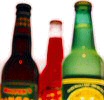 A study that successfully used personality-tailored training to reduce teen drinking is shortly to appear in the Journal of Child Psychology and Psychiatry. It’s interesting because it’s one of a few studies that have found that the psychology of personality is useful for solving clinical problems.
A study that successfully used personality-tailored training to reduce teen drinking is shortly to appear in the Journal of Child Psychology and Psychiatry. It’s interesting because it’s one of a few studies that have found that the psychology of personality is useful for solving clinical problems.
Your average person on the street probably thinks that clinical psychologists spend a lot of time trying to ‘work out’ people’s personalities as a necessary part of treating them.
Of course, this is something that happens as the psychologist meets and talks to the patient, but considering that a great deal of research in psychology is focused on understanding personality, the findings and techniques barely make a scratch on clinical work.
This is largely because using psychological measures to find out whether someone is introverted, extroverted, conscientious, or any other of the so-called ‘big five‘ personality traits, have been found to be of little use in helping treat or prevent mental disorders or behavioural problems.
Compared to reliably assessing someone’s mood, anxiety, risk of self-harm, cognitive abilities or reasoning style, personality is rarely essential for clinical decision-making.
However, one related aspect of personality, similar to the ‘Openness to Experience’ in the ‘big five’ model, has been found to relate to substance misuse.
It’s called ‘sensation seeking’ and it’s been linked to risky behaviour, including binge-drinking and risky sexual encounters.
In this study, led by psychologist Dr Patricia Conrod, the research team assessed the personality of over 350 teenagers and specifically tailored a programme to focus on common differences between high and low sensation-seekers.
The programme had an educational component, a motivational part and a section that taught the kids skills how to solve problems, manage their thoughts and moods, and pick out common cognitive errors when reasoning about drinking.
It turned out that it was particularly effective in reducing binge-drinking in the high-sensation seekers, the most risky group.
As well as developing a useful way of reducing problem alcohol use in teenagers, it’s also interesting to see that a personality measure can be genuinely useful in the prevention of problems.
Clinical psychology is traditionally focused on trying to help with problems after they’ve happened, rather than before, which is perhaps why personality is not so useful. It’s just too subtle when something serious like mental illness affects the mind and brain.
Nevertheless, it’s possible that personality will be key in preventive programmes, where this more subtle approach has much more of an effect when the person is not trying to manage a mental crisis.
Link to abstract of study.